Windsor chair
A Windsor chair is a chair built with a solid wooden seat into which the chair-back and legs are round-tenoned, or pushed into drilled holes, in contrast to standard chairs, where the back legs and the uprights of the back are continuous. The seats of Windsor chairs were often carved into a shallow dish or saddle shape for comfort. Traditionally, the legs and uprights were usually turned on a pole lathe. The back and sometimes the arm pieces (if arms are present) are formed from steam bent pieces of wood.
History
It is not clear when the first Windsor Chairs were made.[1] It is known that, as early as the 16th century, wheelwrights started coping out chair spindles in the same way they made wheel spokes.[2] The design was probably a development of West Country, Welsh and Irish 'stick-back' chairs, but the evidence on origin is not certain.[1] It is thought that the first Windsor chair made its appearance in the county of Buckinghamshire, where the main centre of production eventually moved to High Wycombe.[1] The first Windsors were of the comb-back variety.[1] By the 18th century steam-bending was being used to produce the characteristic "bow" of the Windsor chair.[2] The first chairs made this way were shipped to London from the market town of Windsor, Berkshire in 1724.[2] There is speculation that the chair derives its name from the town of Windsor, which became the centre for the trade between the producers and the London dealers.[1] Thus the name "Windsor Chair" is more about the style of chair than where it was made, with many diverse forms of Windsor chair being made worldwide.[3]
English settlers introduced the Windsor chair to America, with the earliest known chairs being imported by Patrick Gordon who became lieutenant governor of Pennsylvania in 1726. There is speculation that the first American Windsor chair, based on the traditional British design, was made in Philadelphia in 1730.[4]
Forms and construction
There are about seven distinctive forms. These include:
- Sack-back
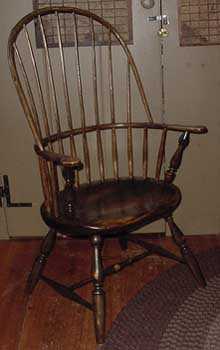 Sack-back Windsor Armchair |
- Hoopback
- Comb-back
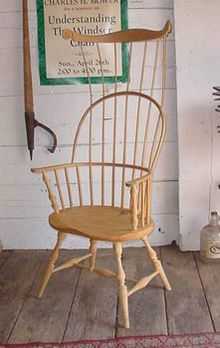 Comb-back Windsor armchair |
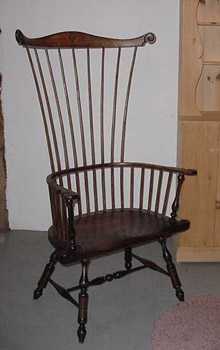 Comb-back Windsor Armchair |
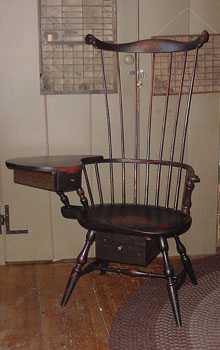 Comb-back Windsor writing chair |
- Continuous arm
- Low back
- Rod back
- Fan back
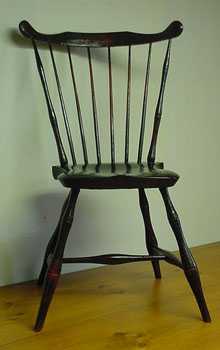 Ricker Fanback Windsor side chair |
 Ricker Fanback Windsor side chair |
 Lyman Mower Windsor side chair |
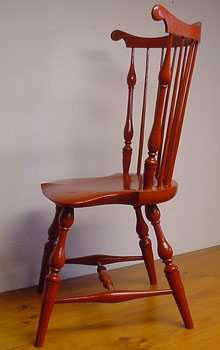 Lyman Mower Windsor side chair |
It is common to find American Windsors made in the 18th century that contain three different species of wood. Pine, bass or tulip poplar are common for the seat. Non ring porous hardwoods such as Maple are stiff and make crisp turnings, and were used for the undercarriage. Ring porous species such as Oak, ash, and hickory all rive (split) and steam bend nicely. These woods are also straight grained and flexible and thus work well for slender parts such as the spindles.
The seat of a Windsor chair is an essential part since it provides the stability to both the upper and lower portions. The thickness of the seat allows the legs to be anchored securely into their respective tapered sockets, providing the undercarriage with strength and stability.[5] A timber that will provide the strength and stability whilst also allowing it to be shaped, in order to achieve the desired look and feel, requires a strong durable timber, with interlocking grain, to provide the right characteristics.[5] English Windsors typically have elm seats because its interlocking grain gives good cross-grain strength that resists splitting where holes are placed close to the edge of a seat.[5] There are no real satisfactory alternatives to elm although other woods have been tried, for example, oak and ash in Britain and various types of pine in the USA.[5] Because of elm's strength compared to pine, tulip poplar or bass, English Windsor chair seats are usually not as thick as American Windsors. The English Windsor chair seats are not saddled (or dished) as deeply as their American counterparts- partly because of elm's relative strength, and partly because elm is comparatively more difficult to sculpt than the softer woods chosen by American chair makers.
The legs are splayed at angles fore-and-aft (rake) as well as side-to-side (splay) to provide actual and visual support of the person sitting. Early chairs made in America usually have stretchers connecting the front and back legs and a cross stretcher connecting the two side stretchers, creating what is known as an "H" stretcher assembly. A common misconception about this assembly is that the stretchers hold the legs together in order to keep them from pulling apart. In the traditional Windsor design, the wedged tenon joint which joins each leg to the seat is strong enough in itself to prevent the legs from creeping outward. The stretcher system actually pushes the legs apart to retain the necessary tension which reduces slack.
"Through-holed and wedged" is one of the primary means of joining Windsor chair parts. A cylindrical or slightly tapered hole is bored in the first piece, the matching cylindrical or tapered end of the second piece is inserted in the hole as a round tenon, and a wedge is driven into the end of this tenon, flaring it tight in the hole. The excess portion of the wedge is then cut flush with the surface. This supplies a mechanical hold that will prevail when the glue fails. In general, early Windsor chair joints are held together mechanically, making glue a redundant detail in their assembly.
| Assembling wedged tenon joints | ||
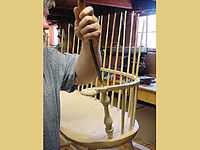 Driving the spindle home |
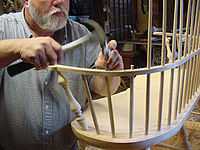 Driving the wedge into the tenon |
 Completed wedges, awaiting trimming |
Painted finishes
Early British Windsors were painted, later versions were stained and polished.[6] American Windsors were usually painted, in the 18th century they were grain painted with a light color, then overpainted with a dark color before being coated with linseed oil for protection of the fragile paint.[7][8] In the 19th century settlers from the mid-west of America to Ontario, Canada would coat their chairs with the solid primary colours of milk paint, a mix of buttermilk, turpentine and cow's blood.[8]
During the early 19th century the United States produced vast amounts of chairs, in factories, and an experienced factory painter could paint a chair in less than five minutes.[8] By mid-century, to save production costs, the chair was painted in solid colours with some simple stencilling being the only design.[8]
With wear in use, the paint wears off around the edges and displays a characteristic wear pattern that reveals the paint colors underneath. As for any antique, this original finish often survives best in unworn areas such as the bottom of the seat or around turnings. Later repainting, even well-intentioned restoration, will diminish the value of an original finish.
See also
- Chair making museum
- List of chairs
- Windsor Institute
- William Showalter
- Wycombe Museum
Notes
- ↑ 1.0 1.1 1.2 1.3 1.4 Hill. Country Chair Making. p. 11
- ↑ 2.0 2.1 2.2 Frankel. Encyclopedia of Country Furniture. p. 164
- ↑ Frankel. Encyclopedia of Country Furniture. p. 163
- ↑ Nutting. Windsor Chairs. p. ix
- ↑ 5.0 5.1 5.2 5.3 Hill. Country Chair Making. pp. 18-21
- ↑ Hill. Country Chairmaking. p. 14
- ↑ Frankel. Encyclopedia of Country Furniture. p. 159 and p. 167
- ↑ 8.0 8.1 8.2 8.3 Frankel. Encyclopedia of Country Furniture. p. 112
References
- Crispin, Thomas (1991). The Windsor Chair. ISBN 0-7509-0117-9.
- Dunbar, Michael (1985). Make a Windsor Chair with Michael Dunbar. Fine Woodworking, Taunton Press. ISBN 0-918804-21-3.
- Frankel, Candie (1993). Encyclopedia of Country Furniture. New York, NY: Friedman/Fairfax. ISBN 1-56799-261-7.
- Hill, Jack (1997). Jack Hill's Country Chair Making. Newton Abbot, Devon: David and Charles. ISBN 0-7153-0313-9.
- Langsner, Drew (1998). The Chairmaker's Workshop: Handcrafting Windsor and Post-and-rung Chairs. Lark Books. ISBN 1-887374-34-5.
- Nutting, Wallace (2003). Windsor Chairs. Minola,NY11501: Dover Publications. ISBN 0-4864-1725-5.